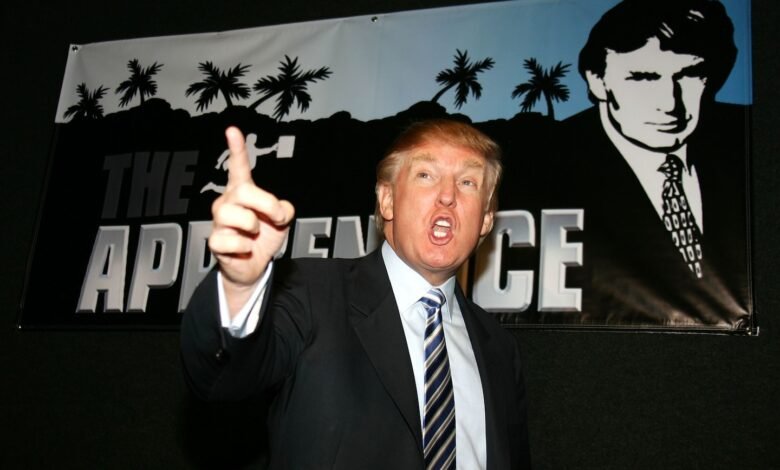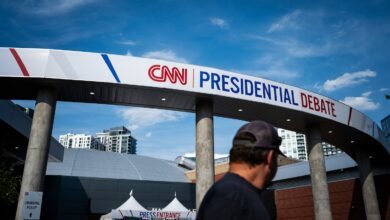‘The Apprentice’ and the creation of Leader Donald Trump

He describes feedback from the network demanding that Trump appear more frequently in episodes (considering how much he was being paid). Thus, the program added segments in which Trump presented his assessment of what the challenges could be like for competitors vying for position in his organization – recorded assessments after challenges have been completed.
“The net effect is not only that Trump appears once again in each episode, but he also now seems prophetic in the way he knows how things will go right or wrong in each individual task,” writes Pruitt. “He seems to see everything and know everything. We are led to believe that Donald Trump is a natural leader.”
At the same time, to foster the perception that Trump was the pinnacle of success, his failures were kept off-screen. Taping a Jessica Simpson show at her signature casino in New Jersey, for example, presented specific challenges, according to Pruitt: “The casino sign lights are off. In fact, Hong Kong investors own the place – Trump just borrows his name. The carpet stinks and the atmosphere at the Simpson show is dilapidated at best.”
The solution: “We filmed all of this.”
Trump’s initial awkwardness in the final, dramatic boardroom scenes of each show was eased as taping progressed. But a new problem has arisen, according to Pruitt.
“Trump made strident comments that he found funny or amusing – some of them misogynistic as well as racist,” he states in the essay. “We cut these comments. Go to one of his rallies today and you might hear a lot of them.”
He also alleges that Trump used a racist slur in an episode planning session, a comment recorded by other participants in the meeting. In a statement to The Washington Post, Trump campaign spokesman Steven Cheung, without providing evidence, called Pruitt’s essay “fabricated” and “fake news.”
Pruitt suggests that all of this — the creation of the infallible Trump, the perfect leader — helped Trump’s election in 2016. He notes that Trump parlayed his new success into “Trump University,” real estate classes that were announced shortly after the second season of program aired and resulted in multiple allegations of fraud. (Trump settled these cases shortly after the 2016 election.) If Trump’s new persona could persuade people to hand over money, why wouldn’t we assume he could persuade people to hand over votes?
In fact, there is new research that strongly suggests so. A paper by Eunji Kim and Shawn Patterson Jr. of Columbia University at the Annenberg Public Policy Center at the University of Pennsylvania uses statistical tools and analysis to assess the program’s effects on Republican primary voters.
“As most voters do not have personal interactions with politicians, candidate-voter connections are primarily parasocial,” they write, referring to a phenomenon in which people build perceived, one-sided relationships with celebrities. The research notes that the first few seasons of “The Apprentice” garnered more viewers than NBC’s evening news, reinforcing the scale at which Pruitt’s deceptions were consumed by Americans.
“Using a survey of white voters conducted before the 2016 presidential election, we found that regular viewers of the show were more likely to trust Trump, feel a personal connection with him, and reject information critical of his candidacy,” Kim and Patterson write. “Open answers reveal even more than eager Apprentice viewers explicitly relied on aspects of his television personality, such as his business experience and leadership potential, to explain their support. In contrast, non-viewers who support Trump were more likely to evaluate his campaign along more typical partisan dimensions.”
This is partly a function of the media; Reports about Trump regularly featured—and reinforced—his role on “The Apprentice.” Trump’s candidacy quickly focused on immigration; Kim and Patterson’s research determined that there was one article mentioning their show for every three that mentioned Trump and immigration.
The fact that Trump emerged from the world of reality television, they argue, also helps explain his politics.
“Relying on public support unmediated by traditional political institutions,” they write, emerging leaders like Trump “can drive dramatic and unorthodox shifts in mass opinion and public policy.”
Trump’s success in 2016 was not just a function of this spectacle. He also had a recurring role on Fox News, appearing as a commentator on its morning show every week for years before announcing his candidacy in 2015. This focus on immigration, first introduced during his presidential campaign announcement, generated enormous coverage news and a reaction that raised his profile with Republican voters. But Pruitt and investigators make a compelling case that the program played a significant role: Pruitt in how he presented Trump and the investigation in how that presentation was received.
“The presumption is that reality television is scripted,” Pruitt writes. “What really happens is illusion of reality, acting out situations against an authentic scenario”.
In the case of “The Apprentice”, this illusion convinced many people, helping to boost Trump for the Republican nomination. Then he became president and abandoned the perceptions created by the TV show. A constructed reality elevated him to the point of being able to change the real reality. Trump was once the outsider seen as extraordinarily capable, thanks to his public persona. Now he is an insider who defines what it means to be a right-wing insider. He is no longer the exception; he made his exception the norm.
Pruitt, very clearly, regrets any role he may have had in making this possible.




